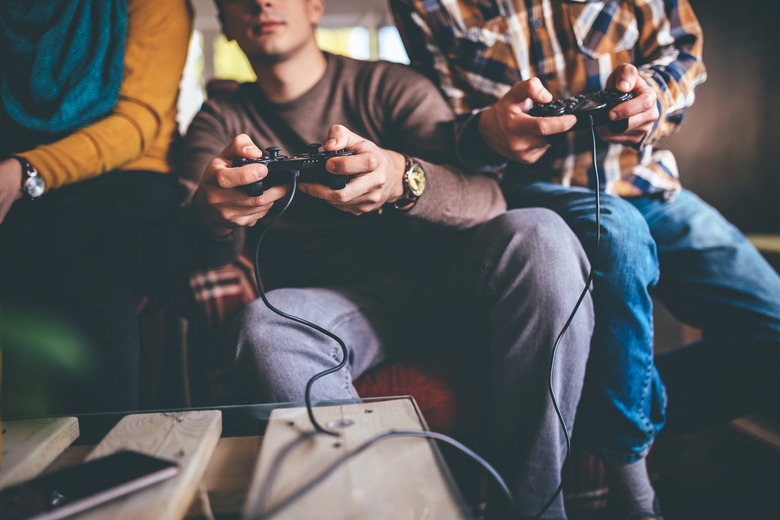This Is Why Fortnite Is So Addictive
Online video game Fortnite launched its new season last week and, well, if you've spent hours and hours exploring the new snowy biome and flying around in planes, you're not alone. Not only is (nearly) everyone in your school probably playing it, but it seems like everyone, everywhere is. Last month, Fortnite logged 8.5 million concurrent players, and announced that more than 200 million people play.
In fact, Fortnite is so popular it's becoming kind of a problem for some gamers. One online divorce specialist service says that Fortnite was the reason behind about 4,500 divorces a year. And some health experts have said that Fortnite is as addictive as heroin.
Yikes, right?
So why is chasing a Victory Royale so exciting – and so rewarding it can actually cause problems for some people? Read on to find out.
First Off, What's Happening in Your Body When You Play Fortnite?
First Off, What's Happening in Your Body When You Play Fortnite?
That rush you get landing in Tilted Towers or pushing the last battle of the match isn't all in your head – but it does start there. Fast-paced games like Fortnite can trigger your brain's fight or flight response. Your body starts releasing hormones, like adrenaline, and your heart starts racing as you get into the match.
Your brain starts working hard, too. Any video game activates the visual-motor system of your brain – the regions that process what you see, and help you respond to it. But Fortnite also stimulates multiple areas of your brain as you combine aiming, strategy and building to win the fight.
All that hard psychological work means that when it pays off – by winning a fight or getting a Victory Royale – you get a big payoff. Specifically, good plays and wins trigger your brain's natural reward system, increasing feel-good hormones like dopamine and, overall, making you feel great.
On top of that, Fortnite is always changing, so there's always something new to explore. And a fast-paced match means the smallest mistake makes the difference between winning and losing – so you want to play another match because you were oh-so-close to victory.
So How does Addiction Fit In?
So How does Addiction Fit In?
Video games like Fortnite feeling rewarding isn't a problem in itself – after all, why would you play if it isn't fun? But the same reward system that gets triggered by a Fortnite win is also involved in addiction.
That's because the reward system in your brain is actually a survival mechanism, according to some evolution experts. Think about it: If your brain is programmed to make you feel great for achieving a goal, you're more likely to do it even if it's hard. If that goal was originally related to survival, you're more likely to survive – at all costs – and pass on those genes to the next generation.
Addiction works by twisting the "goal" into something that won't actually help your survival – like drinking, taking drugs or, in extreme cases, playing video games. It tricks your brain into thinking that the goal is important to your survival, which is why people who have addiction find it so hard to quit. And it's why some people can't stop playing Fortnite – like one teen, who kept playing even as a tornado ripped through his neighborhood.
So When Does Gaming Become a Problem?
So When Does Gaming Become a Problem?
Playing casual games with your friends and putting in time to practice your builds probably isn't a problem – unless it's causing problems in other parts of your life. Most of the time, gaming problems mean you won't get enough sleep, get in the way of your homework and mean you'll enjoy other activities – like hanging out with your friends or family – less. You might also feel distracted or irritated when you can't play as much as you'd like.
If that kinda sounds like you, try cutting back on gaming – or chat with a trusted adult about it. If you're able to balance your schoolwork, extracurriculars, social life and gaming and your friends and family haven't noticed any of the symptoms above, though, you're probably fine. So go get that Victory Royale!
References
- Harm Reduction Journal: The evolutionary origins and significance of drug addiction
- Psychology Today: Is Addiction the Result of Brain Evolution?
- ABC News: Health experts: Video game "Fortnite" can be addictive as heroin
- Psychology Today: This is Your Child's Brain on Video Games
- Psych Guides: Video Game Addiction Symptoms, Causes and Effects
Cite This Article
MLA
Tremblay, Sylvie. "This Is Why Fortnite Is So Addictive" sciencing.com, https://www.sciencing.com/this-is-why-fortnite-is-so-addictive-13715436/. 15 December 2018.
APA
Tremblay, Sylvie. (2018, December 15). This Is Why Fortnite Is So Addictive. sciencing.com. Retrieved from https://www.sciencing.com/this-is-why-fortnite-is-so-addictive-13715436/
Chicago
Tremblay, Sylvie. This Is Why Fortnite Is So Addictive last modified March 24, 2022. https://www.sciencing.com/this-is-why-fortnite-is-so-addictive-13715436/
